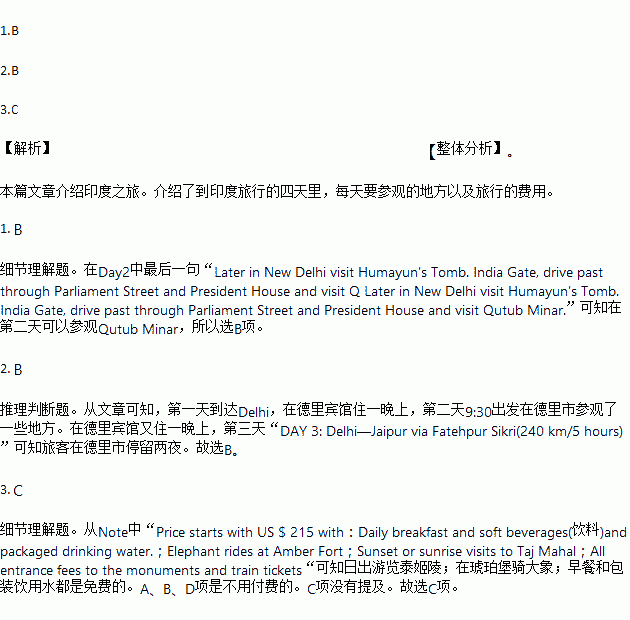题目内容
Journey to India
DAY 1: Arrive in Delhi
Today arrive in Delhi, the national capital of India. Upon arrival at the airport, our company representative will meet you and transfer you to the hotel for check-in.
Overnight at Delhi hotels
DAY 2: Delhi—Full-day tour(old& New Delhi tour)
Today morning have breakfast in the hotel. At 9:30, the tour guide will meet you at your hotel and later proceed for a full-day guided tour in Delhi starting with Old Delhi visiting Raj Gaht. Jama Masjid, driving past through the Red Fort. Later in New Delhi visit Humayun’s Tomb, India Gate, drive past through Parliament Street and President House and visit Qutub Minar.
Overnight at Delhi hotels
DAY 3: Delhi-Jaipur via Fitehpur Sikri(240 km/5 hours)
Today morning after breakfast. drive to Jaipur, the capita] city of Rajsthan state. Jaipur is also known as “Pink City”. En route visit Fatehpur Sikri, known as Ghost. Later continue the drive to Jaipur. Upon arrival, check in at the hotel. Evening: free at leisure for your own activities.
Optional: visits to Chokhi Dhani Village Resort(US $25 per person)
Overnight at Jaipur hotels
DAY 4:Delhi(256 km/5 hours)
Today morning after breakfast, drive back to Delhi airport. The total distance is 256 kms and you can cover it in 5 hours. Upon arrival in Delhi, board flight to onward journey.
NOTE: Price starts with US $ 215 with ?
●Daily breakfast and soft beverages(饮料) and packaged drinking water. ?
●Elephant rides at Amber Fort. ?
●Sunset or sunrise visits to Taj MahaL ?
●All entrance fees to the monuments and train tickets.
1.On which day can you visit Qutub Minar?
A. DAY 1 B. DAY 2
C. DAY 3 D. DAY 4
2.What can we learn from the schedule?
A. The whole journey covers 496 km
B. Travelers will stay in Delhi for two nights
C. Travelers will fly to Delhi airport on DAY 4
D. Travelers will be made to buy things on DAY 3
3.During the trip, you need to pay extra for ______.
A. a sunrise visit to Taj Mahal
B. elephant riding at Amber Fort
C. visits to Chokhi Dhani Village Resort
D. breakfast and packaged drinking water


 nd somebody who works around you complaining(抱怨) all the time, don't you? 1. About 70% of Americans say being around nonstop complainers sometimes has a bad influence on them. Luckily, here are 4 tips to help form positive patterns.
nd somebody who works around you complaining(抱怨) all the time, don't you? 1. About 70% of Americans say being around nonstop complainers sometimes has a bad influence on them. Luckily, here are 4 tips to help form positive patterns.